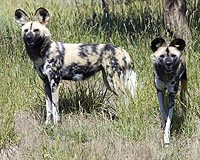| . |  |
. |
Twin Cities MN (SPX) May 27, 2009 A team of researchers, led by the University of Minnesota, addressing long-standing conflicts in ecology and evolutionary science, has provided key directions for the future of community ecology. The team comprehensively synthesized emerging work that applies knowledge of evolutionary relationships among different species - phylogenetics - to understanding species interactions, ecosystems and biodiversity. The work, published in the May issue of Ecology Letters, was conducted by a subgroup of researchers participating in an interdisciplinary working group convened by the National Center for Ecological Analysis and Synthesis (NCEAS) at the University of California, Santa Barbara. The research was supported by funding from NCEAS, the Long-Term Ecological Research Network Office, the National Science Foundation and the Natural Sciences and Engineering Research Council of Canada. "For a long time, ecologists ignored the importance of evolutionary processes in understanding how species coexist and how diversity is maintained," said Jeannine Cavender-Bares, a professor at the University of Minnesota, and lead author of the study. "But ecological processes we observe in the present are deeply influenced by evolutionary processes in the past. Thanks to the increasing availability of large DNA and phylogenetic databases, we now have the tools to bring an evolutionary perspective into ecology." NCEAS hosts hundreds of scientists a year who analyze vast amounts of existing information from numerous prior research studies, in order to look for patterns and make new discoveries. For this study the researchers synthesized more than 180 major studies from both fields, and developed a comprehensive overview of the forces driving community organization, and the role evolution plays in the assembly of these communities. What's truly exciting is how we are beginning to accumulate evidence that community structure and interactions through time can feedback to promote or constrain diversification of species," said Ken Kozak, also a professor at the University of Minnesota. "The blurring of boundaries between classical community ecology and biogeography has been key to recent progress in community ecology." "Essentially, we're going back to the perspective of early naturalists, but with a computational rigor that was never before possible," according to Cavender-Bares. "This basic understanding of the causes and consequences of community structure has never been more important." In the face of increasing habitat destruction around the world, these tools will prove critical to managing and restoring Earth's flora and fauna. Share This Article With Planet Earth
Related Links University of Minnesota Darwin Today At TerraDaily.com
 Carnivores Can Be AntiSocial And Successful
Carnivores Can Be AntiSocial And SuccessfulWashington DC (SPX) May 27, 2009 Packs of hunting dogs, troops of baboons, herds of antelope: when people observe social animals, they are often struck by how intelligent they seem, and recent studies suggest that sociality has played a key role in the evolution of larger brain size among several orders of mammals. But new research from two evolutionary biologists, John Finarelli of the University of Michigan and John ... read more |
|
| The content herein, unless otherwise known to be public domain, are Copyright 1995-2009 - SpaceDaily. AFP and UPI Wire Stories are copyright Agence France-Presse and United Press International. ESA Portal Reports are copyright European Space Agency. All NASA sourced material is public domain. Additional copyrights may apply in whole or part to other bona fide parties. Advertising does not imply endorsement,agreement or approval of any opinions, statements or information provided by SpaceDaily on any Web page published or hosted by SpaceDaily. Privacy Statement |